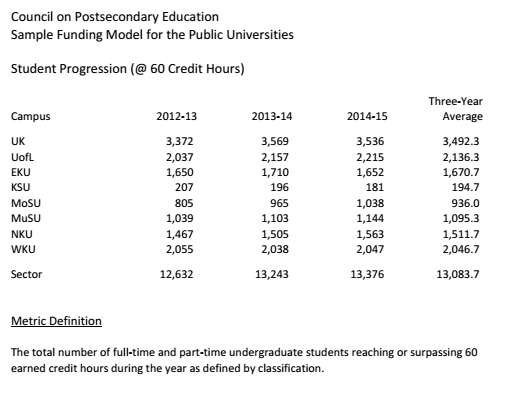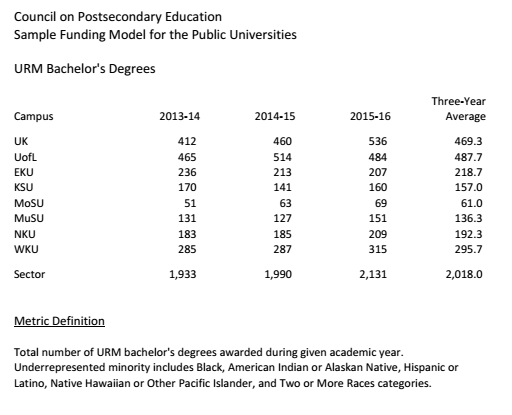“We can talk about performance-based funding and all the
different goals that are set out in the bill …
but the simple fact of the matter is that unless this General Assembly
is willing to put more money into postsecondary education as we go
forward, the cost of a college degree will only continue
forward, the cost of a college degree will only continue
to increase for tens of thousands of Kentucky students
who want to better their lives,”
--Senate Minority Leader Ray Jones, D-Pikeville
The big selling point in favor of Senate Bill 153 is the fact that all university presidents - with varying degrees of enthusiasm - signed off on the proposal. What our legislative leaders fail to point out in testimony before their peers, however, is the other message that was delivered - that failure of the university presidents to agree to a plan would lead to a legislatively imposed funding system that would likely be even worse. I do not mean to suggest that the presidents were threatened. I have no reason to doubt that they were promised. But as UK Trustee David Hawpe observed, "when the Council on Post-secondary Education leadership and the campus presidents knuckled under to the governor’s bullying, the game was over."
The goal of Senate Bill 153 “is to change this funding model, to refocus us on that goal of degree attainment,” said Senate President Pro Tem David Givens, R-Greensburg, who is a primary sponsor of the legislation, along with Sen. Mike Wilson, R-Bowling Green. But degree attainment is already central to every university's mission, and has been under higher ed reform.
 A 2011 study found that Kentucky significantly increased the rate at which bachelor’s degrees were produced in the 12-year period of time following passage of reform legislation in 1997 - at a 36% rate, which is greater than more than half of the other states.
A 2011 study found that Kentucky significantly increased the rate at which bachelor’s degrees were produced in the 12-year period of time following passage of reform legislation in 1997 - at a 36% rate, which is greater than more than half of the other states. Staying on pace, in 2016, CPE reported that Kentucky "conferred a record 65,829 degrees and credentials during the 2015-16 year, representing a 2.7 percent increase from the previous year and a 32.5 percent gain over 10 years."
Senate Majority Floor Leader Damon Thayer, R-Georgetown, said university funding has lacked accountability. If that is true, it can only mean that the legislature has not paid attention to the performance data that is already available. What is lacking however, is a formal process of annually vetting accountability data publicly in the manner that we publish K-12 school accountability data. That could happen without legislation.
Aside from that, there's really not much to recommend performance funding. The Century Foundation report, "Why Performance-Based College Funding Doesn’t Work" found that "while pay-for-performance is a compelling concept in theory, it has consistently failed to bear fruit in actual implementation, whether in the higher education context or in other public services. Despite the logic, research shows that tying financial incentives to performance measures rarely results in large or positive outcomes that are sustained over time." While the rationale sounds promising, 12 different studies have failed to establish that performance funding in higher ed has worked anywhere. In Indiana, where performance funding has been in use since 2003, "universities have become more selective and less diverse while also not improving degree production." After a decade of performance-based funding Pennsylvania failed to produce more degrees. Tennessee jacked up their financial incentives, thinking that would do the trick, but graduation and retention rates failed to improve.
It may be easy to count graduates,but producing them is a different matter.
At a time when our state needs a greater percentage of our citizens to be highly-educated in order to satisfy the ever-increasing demands of business and industry, we find that long-term disregard for our state pension systems has left Kentucky ill-equipped to support other critical needs.
What Senate Bill 153 does very well is give politicians a performance-based rationale for continuing to under-fund its universities. It is that disinvestment that is driving up tuition costs - the only alternative being a lowering of academic standards, removal of more programs and teachers, or a fundamental change in the very nature of campus life which would likely push Kentucky students toward other states' institutions.
But by all indications SB 153 is set to pass. So to promote better understanding of the metrics involved, KSN&C submitted an open records request to gain “any and all public records related to the most recent institutional data for each university overseen by CPE that could potentially be impacted by Senate Bill 153 including, but not limited to, numbers of degrees conferred, students enrolled, credit hours earned, and all other factors anticipated in the legislation.” The data we received from CPE is meant to provide current metrics for each institution as if SB 153 were in effect today. If deployed, this model would be updated as new data is received from the institutions. Here's the bottom line:
If performance funding were in effect today, UK would effectively capture $1.6M that UofL loses, Morehead would be penalized $2.9M, and I suspect, Kentucky State would close, or come close to it. Of course, K State is being held harmless for the time being, while WKU and NKU received extra support.

https://drive.google.com/file/d/0B_ChD3Okq_aYT29JREpnYW95V0U/view?usp=sharing
https://drive.google.com/file/d/0B_ChD3Okq_aYbms3MW9aVEIzTTA/view?usp=sharing
https://drive.google.com/file/d/0B_ChD3Okq_aYbms3MW9aVEIzTTA/view?usp=sharing
https://drive.google.com/file/d/0B_ChD3Okq_aYMEtkY1NBSEJhRDg/view?usp=sharing
https://drive.google.com/file/d/0B_ChD3Okq_aYLWEtSGI4VlFvSzQ/view?usp=sharing
https://drive.google.com/file/d/0B_ChD3Okq_aYZk4xQW1lcTlScHM/view?usp=sharing
https://drive.google.com/file/d/0B_ChD3Okq_aYWENqWXlfN1FwU2s/view?usp=sharing
https://drive.google.com/file/d/0B_ChD3Okq_aYdWxmNjVfakdadjg/view?usp=sharing
https://drive.google.com/file/d/0B_ChD3Okq_aYSG1mMDN6eG9kVzQ/view?usp=sharing
https://drive.google.com/file/d/0B_ChD3Okq_aYa0FvZURDbkhZdXM/view?usp=sharing
https://drive.google.com/file/d/0B_ChD3Okq_aYSndxMDdxS1EzQVk/view?usp=sharing
https://drive.google.com/file/d/0B_ChD3Okq_aYRU5KeEpaOXNSTnc/view?usp=sharing
https://drive.google.com/file/d/0B_ChD3Okq_aYTV9IQWtNYTNaYUE/view?usp=sharing













No comments:
Post a Comment